-
Washington-based think tanks going Chinese
With China's fast rise, think tanks in nation's capital are expanding their related work on the country, Chen Weihua reports from Washington.On Sept. 22, the day Chinese President Xi Jinping landed in Seattle for his first state visit to the United States, one event in the Emerald City didn't really make any headlines.The Brookings Institution, the top-ranked think tank in the US and worldwide, inaugurated its China Council in a ceremony held at the law offices of Dorsey and Whitney in the Columbia Center building, the tallest in Seattle.The ceremony was followed by a public event at Seattle University, where some of Brookings' top China scholars, such as Jeffrey Bader, David Dollar and Cheng Li, joined Washington State's Democratic Congressman Rick Larsen, co-chair of the House US-China Working Group, and several others to explore the challenges and prospects of US-China relations.Brookings setting up its China Council is an example of a new and expanded focus going on among the close to 400 think tanks in the nation's capital: China. Simply put, the world's second-largest economy is a hot topic among the think tanks, and on an average day they put on multiple events, ranging from discussions on China's economic slowdown and its actions on climate change to tensions in the South China Sea and the newly launched Asia Infrastructure Investment Bank.Brookings' China Council is designed to provide financial and intellectual support for its John L. Thornton China Center in Washington and the Brookings-Tsinghua Center in Beijing, both set up in 2006. Its founding members include more than a dozen business and opinion leaders such as former US ambassador to China Jon Huntsman and Yahoo co-founder Jerry Yang. John Thornton, co-chair of the Brookings' board and Qiu Yong, president of Tsinghua University, serve as honorary co-chairs.Martin Indyk, Brookings' executive vice-president and a two-time US ambassador to Israel, described the centers in Washington and Beijing as "two parallel operations that enhance each other" and a vision by Thornton.Bench of scholarsWhile saying that the Thornton center has built a "deep bench of scholars" on China, Indyk acknowledged that resources at the Tsinghua center are limited.Qi Ye, director of the Brookings-Tsinghua Center and an expert on China's low carbon policies, is now the only resident scholar while other Chinese and American scholars associated are all non-resident."We felt we really needed to build up the Brookings-Tsinghua Center as well, so this would be more like in parallel in terms of the capabilities," said Indyk, citing the growing policy issues that need to be tackled with China's rise."To do that, we decided that it makes sense to have a group of individuals, corporations, both American and Chinese, who would support the work of both centers, and who would see the value of independent research by a think tank, both for China and for United States," he said.With the launch of the China Council, the Tsinghua center plans to add three more residential scholars over the next three years, recruit two post-doctoral fellows a year, establish a regular visiting scholar program, create a new academic advisory committee and expand office space. The Thornton center will expand by forging ties with Tsinghua, launch signature forums, recruit young rising stars, establish endowed chairs, name visiting scholarships and sponsor internships.Expanding researchBrookings is not alone in expanding research on China.The Carnegie Endowment for International (CEIP) Peace, set up in 1910 and housed in a building next to Brookings on Massachusetts Avenue, was once focused on transatlantic issues and the Soviet Union. But it started to hire scholars to work on the Chinese economy, politics and strategy starting in the 1990s with China's rise."If we are going to be taken seriously as a think tank and be competitive in Washington, we have to be in the game of analyzing China as well," said Douglas Paal, vice-president for studies and director of the Asia program at CEIP.CEIP is ranked second in the US by the Think Tanks and Civil Societies Program (TTCSP) at the University of Pennsylvania, which annually publishes The Global Go To Think Tank Index Report.Paal joined CEIP in 2008 after working on China at various US government departments, from the White House and the State Department to the Central Intelligence Agency. He was an unofficial US representative to Taiwan as director of the American Institute in Taiwan from 2002 to 2006.In 2010, CEIP launched its Carnegie-Tsinghua Center for Global Policy at Tsinghua University in Beijing, which focuses more on issues relating to China's foreign relations, energy and climate change.The center regularly brings together Chinese and US experts for conferences. The one on China-US security cooperation held in June this year amid the growing tension in the South China Sea drew a high-caliber panel that included CEIP President William Burns, who was US deputy secretary of state until a year ago; Stephen Hadley, US National Security Advisor under President George W. Bush; Gary Roughead, chief of US Naval Operations from 2007 to 2011 as well as He Yafei, China's former vice- foreign minister and Chen Xiaogong, former vice-commander of the People's Liberation Army Air Force.Paal has been kept busy too, travelling frequently to China.The same trend of having a greater focus on China and all of Asia is happening at the Atlantic Council think tank, which has long focused on trans-Atlantic issues. The council is said to be debating whether to change its name after expanding its research to include Asia, Africa and Latin America. The council has quadrupled in size since Fred Kempe, a former Wall Street Journal journalist, took office in 2007 as president and CEO.Robert Manning, a senior fellow at the Brent Scowcroft Center on International Security at the Atlantic Council, said unlike Brookings, its China research is still scattered at various centers. "But it's already amazing for one that traditionally focuses on trans-Atlantic studies," said Manning, who had worked in the State Department, the National Intelligence Council and as director of Asian studies at the Council on Foreign Relations.The centers on Latin America, Africa and South Asia and the programs on energy and global business and economy all conduct research relating to China.Manning's words are reflected in Washington's think tanks today.Jon Huntsman, chairman of the Atlantic Council, has encouraged the council to do more on Asia and China, according to Manning."We are trying to institutionalize ongoing Asian programs, so far I have been doing more from project to project," Manning said, adding that funding is still an issue.Joint projectsIn September 2013, the Atlantic Council and the China Institute of International Studies (CIIS) jointly turned out a report after a yearlong US-China joint assessment project. The report, China-US Cooperation: Key to the Global Future, concluded that any hopeful global scenario can only be realized if there is close cooperation between China and the US.In a report co-written with Olin Wethington, Manning argued that the US needs a strategy for constructive engagement that leads to an inclusive and rules-based order that fosters prosperity and cooperation in Asia. "Neither US withdrawal nor aggressive containment is desirable," they wrote in the report titled Shaping the Asia-Pacific Future.Manning said he might start another project on Northeast Asia, in cooperation with the China Institute for Contemporary International Relations (CICIR).Joint research is common between US and Chinese think tanks. Paal said CEIP and the China Foundation for International and Strategic Studies (CFISS) have conducted joint projects on China-US crisis management for more than 10 years, each paying their own costs.Robert Daly, director of the Kissinger Institute on China and the United States at Wilson Center, said his institute will join the CEIP and Luo Yuan of the PLA Academy of Military Science in a new US-China Security Perceptions Survey, a poll of elite and popular opinion in the two countries on comparative hard and soft power in 2016 and beyond.While Luo has been regarded by some in the West as nationalistic and anti-American, Daly described him as "professional, collegial and a good partner."CEIP and Luo's team did a survey on the subject in 2013, but Daly said that so much has changed under President Xi that "we have to do it again".The Kissinger Institute was founded in 2008 and directed by former US ambassador to China Stapleton Roy, a highly respected expert on China and the son of a US missionary in China. Daly, who headed the Maryland China Initiative at the University of Maryland, took over in August 2013.Daly acknowledged that his institute is small compared with Brookings and CEIP, so it has to focus on things that can distinguish it from others."There is a plan that requires funding. But I would say the trend lines are good because China is such an important topic Not everyone in the Wilson Center can say that," said Daly, who, like his predecessor Roy, speaks fluent Chinese.Unlike most think tanks in Washington, the Wilson Center, which is ranked fifth among US think tanks, is housed in a wing of the Ronald Reagan Building, a federal office building. It receives about $10 million, or about a third of its annual operating fund, from a US government appropriation. Other funding comes from foundations, grants, corporations and endowments.Asked if the government money has compromised the research, Daly acknowledged it's a reasonable suspicion. "But in fact, the answer is no," he said.Non-partisan wayWhile Daly is paid by the US government, he has to raise money for his staff. "We can and we do criticize the government all the time. We have to do it in a non-partisan way," he said.In an article entitled Foreign Powers Buy Influence at Think Tanks published in September 2014, The New York Times reported that the Atlantic Council has received donations from more than 25 governments outside the US since 2008.But Manning, the senior fellow there, said there is a big emphasis on intellectual independence. "If there is funding from a particular government, we design the project and it doesn't influence our outcome or view in any way," he said.Paal of CEIP also disagreed with the Times article, saying countries like Norway have no interest in buying think tanks; they just think it's more efficient to use US think tanks than starting their own.The US leads the world with 1,830 think tanks, followed by China's 429, the UK's 287, Germany's 194 and India's 192. Of the US think tanks, about 400 are in Washington and another 150 in neighboring Maryland and Virginia, all in a bid to have the maximum impact on the government, lawmakers, the news media and the public.The CEIP has an endowment in excess of $200 million that covers 50 percent of the cost, with the rest from major corporations, foundations and individuals.The Carnegie-Tsinghua Cener is also funded by CEIP alone. Paal said the CEIP does not accept money from the Chinese government, but does accept donations from Chinese individuals not associated with the government.Operation costBrookings' Indyk said of the institution's annual operation cost of $100 million, only 15 percent comes from its endowment, while the remaining 85 percent has to be raised."We are involved in a big fund-raising operation. It never stops," he said. Like most think tanks, Brookings' fund-raising comes from four sources: individuals, corporations, foundations and governments.Indyk said Brookings does not take money from the US government for research, except for conferences. He emphasized that when Brookings takes money from governments, it makes very clear to them that Brookings decides what it will research, who will do the research and what the funding will be, adding that foreign governments are very respectful of Brookings' independence.While not ruling it out in the future, Indyk said Brookings has not taken money from the Chinese government. He speculated that it might be the Chinese government which does not want to be associated with independent research they might not agree with.Indyk said Brookings has many relationships with Chinese think tanks, mostly in holding conferences but not joint research.In April 2013, President Xi made the development of think tanks a national strategic priority and called for the building of "new think tanks with Chinese characteristics."That has prompted many Chinese think tanks to seek help and cooperation from overseas partners, especially in the US and Europe.In October, as many as 15 scholars from Brookings's foreign-policy program, including experts on the Middle East, were in China. "They think it's a result of China's great engagement with the world," Indyk said.Indyk, along with his China scholars Kenneth Lieberthal and Cheng Li, was in Beijing in April 2014 for a US-China think tank summit, offering their advice to Chinese counterparts.Paal of CEIP indicated that he has been approached by 44 new think tanks in China this year, looking for advice from how to run a think tank and raise money, to hiring people and publishing."I understand, but I cannot brief every think tank. That's too much time," he said.Paal's advice is that if you want credibility as a think tank, you have to attend to basic things such as independence.Daly of the Kissinger Institute said that the level of talent in Chinese think tanks is as high as anywhere in the world. But he frowned at the concept that these think tanks should be part of China's soft power strategy. "They will not have any credibility unless they are seen as critical thinking and truly independent analysts in international terms," he said.Cheng Li, director of the John L. Thornton China Center at Brookings, noted that many of the Chinese visiting scholars Brookings hosted over the years are playing a big role back in China.He believes that independence would be too high a standard set for Chinese think tanks now. While Brookings is obsessed with independence, not every US think tank is independent and some actually serve one particular party or interest group.China and Asian scholars at the Heritage Foundation and American Enterprise Institute, widely regarded on the far conservative side, did not respond to China Daily's request for interviews.In Li's view, diversity is what Chinese think tanks should pursue. "Only when there is diversity, will there be different voices. When government decision-makers hear these different voices, they can make choices," he said.But Li believes there could be higher standards when there is a more open environment in the future. He has spearheaded the Thornton Center Chinese Thinkers Series, a set of publications that introduce Chinese thinkers to English language readers.Li, widely regarded as the most prominent Chinese-American in US think tanks, said China will become a think tank giant eventually. "Sooner or later China will have its own Brookings or CEIP, but it's going to take time and it won't happen immediately," he said, adding that the Brookings-Tsinghua Center has a special role to play there.The think-tank push in ChinaWhile China is a hot topic among US think tanks, think tanks are hot in China. And the force behind it is President Xi Jinping.China has more than 400 think tanks, but only seven ranked among the top 100 worldwide in the 2014 Global Go To Think Tank Index Report.In October 2014, Xi issued a call for building of 'new think tanks with Chinese characteristics' at a meeting of the Leading Group for Overall Reform.'It should be targeted on promoting scientific and democratic decision making, promoting modernization of the country's governing system and ability, as well as strengthening China's soft power,' he said.Although think tanks in China are developing rapidly and making important contributions to reform and modernization, they have a hard time changing alongside rapid development. Currently, China lacks think tanks with great influence and international reputation, Xi said.In responding to the government's call to build 50 to 100 high-end think tanks, existing think tanks have released reform and rebuilding plans, and new think tanks have mushroomed in China, writes Yanzhong Huang in China's Think-Tank Great Leap Forward, published on Sept 28 on the website of the New York-based Council on Foreign Relations.'As Professor Yan Xuetong of Tsinghua University observed, nowadays 'each unit is building a think tank, and all universities are building think tanks','wrote Huang, a senior fellow for global health at the Council and a professor and director of global health studies at the School of Diplomacy and International Relations at Seton Hall University.From China Daily, Nov. 27, 2015
2015年12月1日 -
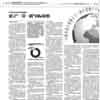
【第一财经日报】建立“一带一路”国际联盟
文/中国与全球化智库(CCG)王辉耀、孙玉红、苗绿标准是一个国家参与全球竞争的重要手段,是一个国家综合实力的体现,掌握了标准就掌握了国际竞争的话语权。要推动中国标准国际化,助力中国企业“走出去”,政府应发挥主导作用。 2014年,中国对外直接投资规模达到1400亿美元,已与外商来华投资实现初步平衡,成为全球对外投资最大的发展中国家。在世界经济深度调整以及中国“一带一路”战略构想推进实施的大背景下,众多企业“走出去”开拓国际市场。在即将到来的“十三五”时期,中国企业的全球化将迎来爆发式增长。 但由于中国企业全球化发展的时间较短,加上制度、语言、文化、政治等多种因素的影响,中国企业在全球化过程中面临比其他国家企业更为复杂的形势与风险。 2014年以来,中国与全球化智库通过对已“走出去”企业的考察、对企业高层管理人员的采访以及多种形式的论坛研讨和问卷调查等,对中国企业在全球化发展过程中存在的问题进行了探析。根据中国与全球化智库的研究,我们发现中国企业“走出去”存在一些问题。 针对存在的问题,中国与全球化智库在大量案例研究的基础上,提出以下几点发展建议: (一)加快推进中国标准“走出去”。 标准是一个国家参与全球竞争的重要手段,是一个国家综合实力的体现,掌握了标准就掌握了国际竞争的话语权。要推动中国标准国际化,助力中国企业“走出去”,政府应发挥主导作用,中国与全球化智库认为可以从以下几方面开展工作: 促进国内标准的统一与更新升级。目前中国国内标准有国家标准、行业标准与地方标准等,部分标准较为宽松,与欧美发达国家标准水平有一定差距,尤其是部分行业标准与地方标准,落后于国际产业发展的实际情况。国家应推动中国标准的升级,促进中国标准与国际标准接轨; 提升中国在国际标准体系中的参与度与话语权。政府应加强与国际各标准组织的合作,安排中国员工到各标准组织任职,在国际标准制定中体现中国意志; 与欧美标准大国合作,开展标准互认工作。欧美国家经济发达,除这些国家本身外,亚、非、拉很多发展中国家也采用欧洲或美国标准,中国应与这些国家的标准委员会合作,拟订标准互认清单,开展标准互认; 推动中国标准“走出去”成为国际标准。通过对外援助、贷款、对外工程承包等附加条件方式把中国标准带出去,形成中国标准的突破; 通过样板工程推广中国标准。“一带一路”沿线国家将是未来中国企业“走出去”的重点区域,可以通过在这些国家建立样板项目,建成中国标准的示范工程。 此外,国家也要做好中国标准的翻译等服务工作,提供不同语言的中国标准,助力企业“走出去”。 (二)加大金融对企业“走出去”的支持力度。 纵观欧美地区对外投资大国海外投资的发展历程,各国的金融政策在促进对外投资上发挥了重要作用。在金融支持企业“走出去”方面,虽然我国已出台了很多规定与意见措施,但目前能满足企业对外投资需求的金融政策制度还很不完善,有关政策措施的科学性、可操作性还有待进一步加强。 我们认为,可以考虑从四个方面促进中国金融业对企业“走出去”的支持力度: 一是积极参与推进国际金融新秩序的构建,推进国际货币体系的多元化,提升中国在国际金融体系中的话语权,实现中国由金融大国向金融强国的转变; 二是大力推进人民币的区域化与国际化,人民币的国际化可以促进中国海外投资的便利化,为“走出去”的中国企业降低成本和规避风险,中国应首先推进人民币在亚洲的区域化,亚洲的东南亚国家是中国对外投资流量与存量最大的区域,以亚洲为基础,实现人民币的区域化,有利于促进中国在这些国家与地区的投资,同时需要建立人民币离岸金融市场,推动人民币参与国际结算,逐步扩大人民币国际化范围; 三是加大国内金融体制改革开放力度,建立大型国有银行、中型商业银行与小银行相结合的银行群落,增强银行金融机构对“走出去”企业的信贷支持;建立多层次资本市场体系,扩大“走出去”企业的直接融资渠道;建立市场化的保险体系,为“走出去”企业保驾护航,提供风险保障; 四是建立更多的“走出去”政策性基金,推动国家主权基金、政策性基金对企业“走出去”的支持。(三)提升海外投资信息服务水平。 根据中国“走出去”信息服务现状,中国与全球化智库认为,相关部门在现有工作的基础上可以从三个方面加强对“走出去”的信息支持: 一是建立“走出去”数据库,收集各国投资的基本信息,特别是对信息进行提炼和整理,保证信息的权威性、及时性和准确性; 二是公开信息,政府所掌握的有关海外投资的信息,除涉及国家机密、企业商业机密的,其余均应作为公共信息,通过一定的途径向有“走出去”需要的企业公开,提高企业及时获取海外投资信息的能力; 三是建立海外突发安全事件信息通报机制。在一些发展中国家,由于政局变化、地缘政治冲突、武装冲突、民族冲突、宗教冲突、恐怖袭击与治安犯罪等原因,对在东道国的中国企业员工与财产安全造成潜在影响,政府部门在及时掌握这些信息的基础上,要对这些安全因素进行评估,并在第一时间通报给在这些国家与地区的中国企业及员工,帮助企业与人员做出风险判断。 (四)加强“走出去”的领事保护机制建设。 中国应在坚持和平与发展的基础上,丰富“经济外交”的内容,为中国企业“走出去”创造更加有利的外部条件。针对中资企业及人员面临的不断上升的海外安全风险,应不断完善领事保护制度,保护中国“走出去”企业在海外的合法利益与人员安全: 一方面要建立和完善海外应急及快速反应机制,在国内需要与相关部门理顺关系时分工合作,协调一致,一旦发生涉及中国的海外安全事件,快速启动应急机制,实施救助;在国外,需要与相关国家加强合作,签订安全联动保护的双边协定,为海外应急机制快速发挥效用奠定基础。 另一方面,要加强领事保护能力建设,领事保护主要通过外交协调实现,外交协调能力的强弱在一定程度上决定了领事保护行动的成败,因此要求提升我们的外交协调能力。 另外,领事保护机制应着重风险预警提示,加强对“走出去”企业与人员的指导,要求他们出国后要合规经营,遵守当地法律,加强自我安全保护,尽可能减少需要保护的事件发生。 此外,在海外也应建立相应的国际司法合作,一旦领事保护行动达不到预期目标,就应启动海外司法保护程序,最大限制地保护中国企业与公民的利益与安全。 (五)以企业为主体积极推动海外园区建设。 海外园区有利于发挥企业的群体优势,对于中国企业“走出去”是一个较为理想的选择,尤其是随着“一带一路”战略构想的实施,在“十三五”时期将有更多企业“走出去”在“一带一路”沿线国家建设各类性质的园区。要最大限度地发挥海外园区对中国企业“走出去”的带动作用,提升海外园区的效益,中国与全球化智库建议: 一、发挥海外园区开发建设的企业主体作用,减少海外园区建设的指令性任务,弱化海外园区的政治意义,以市场为导向,以营利为目的,海外园区建不建、怎么建,企业说了算。 二、发挥政府在海外园区开发建设中的政策导向作用,对海外园区的整体规划、园区的产业定位等做宏观指向。 三、加大对海外园区的支持力度。一方面是加大对海外园区开发建设的资金支持,目前虽然国家对审核批准的境外经贸合作区有一定的资金支持,但海外园区的建设周期长、资金需求量大,政府的补贴远远不够,对于没有通过审核批准的园区,面临的资金压力更大。另一方面对中资企业较为集中的海外园区要提供必要的安全防护,尤其是对于恐怖主义高发、政治不稳定的发展中国家,国家应提供必要的安全保护。 四、加强双边政府间的协作,对于企业自主确定要开发建设的海外园区,政府应通过外交等途径,助推中资企业开发建设的园区与东道国开发计划接驳,协助企业解决海外园区开发建设过程中与当地政府部门沟通不畅的问题。 (六)加强海外宣传,塑造有利于中国“走出去”的舆论环境。 随着中国对外投资在“十三五”时期将加速增长,西方媒体有关中国对外投资的负面解读会增多,这将对中国的对外投资产生不良影响。中国应加强海外宣传,鼓励国内媒体到海外投资,参股海外大型媒体,改变舆论竞争“西强我弱”的态势,为中国企业“走出去”做好服务。 (七)有所为有所不为,规避“走出去”地缘政治风险。 “一带一路”几乎经过或辐射了世界上政治形势最为复杂的几个地区,一方面,沿线国家本身具有独特的政治、宗教、民族环境,甚至有一些国家国内长期处于政治动荡之中,对外深陷大国博弈的战场;另一方面,少数国家与中国因地缘关系存在领土利益分歧,当分歧不能被管控在理性磋商的范围内,就容易被激化成不同层级的外交事件,对双边经济合作以及中国企业的投资造成影响。 针对近年来日趋复杂的政治形势,中国企业在“走出去”以前,一定要做好风险评估,有所为也有所不为,对于政治风险高发国家,要采取灵活措施,规避风险。对于政治非常不安定的国家与地区,可以选择投资回避;对于政治风险相对较高的国家与地区,可考虑在该国与地区周边投资,以商品贸易延伸的方式覆盖;而对政治风险存在高发可能的国家,要注意规避投资回收期限长的项目。(八)打造样板工程,推动“一带一路”战略构想实施。 目前,中国的“一带一路”顶层设计已经具备,在接下来的落到实处工作中,打造几个样板国和样板工程,可以为以后的推进建设树立模板。同时,需要建立“一带一路”的国家联盟,有一个共同交流、协调的机制。(九)利用华侨的天然优势推进“一带一路”。 “一带一路”沿线途经六十多个国家,这些国家宗教文化各异、民族关系复杂,发展程度不同,中国企业对这些国家的了解程度普遍不高,加上这些国家多为小语种国家,在语言上对中国企业构成一大挑战,中国企业进入这些国家经营,将面临严峻考验。要克服进入“一带一路”沿线国家存在的问题,充分利用当地华侨的力量尤为重要。 从历史上中国移民的走向看,过去华人正是沿着陆上“丝绸之路”和海上“丝绸之路”走向世界的。我国海外华侨华人中约有三分之二居住在东南亚,包括印尼、新加坡等国家,这些国家恰恰是“21世纪海上丝绸之路”的必经之地。近年来,华侨华人的经济实力有了很大提升,逐渐融入当地主流社会,政治社会地位不断提高。这部分人士积极承担投资经商等经济活动,成为国家“硬实力”的载体,又在无形中不断传播着中华文化,成为国家“软实力”的载体。 (十)建立“一带一路”国际联盟。 我们建议建立“一带一路”国际联盟,形成一个共同交流、协调的机制,在加强各国资金、基础设施、产能、人才和移民等方面合作意义重大,因此可以考虑建立“一带一路”国际联盟或者“一带一路”国际委员会,建立“一带一路”的全球治理、区域治理的新秩序。 (十一)发挥智库在“一带一路”建设中的作用。 我们认为,不断发展壮大的中国智库在“一带一路”建设中可以发挥更大的作用。智库可以探讨各种机制、方案,寻求利益的平衡,如果两国或多国的智库达成共识并提出良好的建议,政府间的合作方向就会更明确。 所以我们认为,应充分发挥智库在“一带一路”建设中的作用,建立一个“一带一路”智库峰会或智库联盟,通过智库来探讨、推动“一带一路”战略构想的实施。 “一带一路”的沿线国家很多,还有很多事情需要做。中国的企业、机构、国民到国外合作需要注意一些政治、经济风险等,智库的研究可以提供指导,这是中国目前非常需要的。此外,中国的跨国公司还不是很强大,“走出去”的基本是中小民营企业,智库可以将它们凝聚起来,并给中央提出一些政策建议。 (十二)建立“21世纪海上丝绸之路港口联盟”。 “一带一路”沿线覆盖人口超过40亿,占全球总人口的2/3。其中,“海上丝绸之路”建设具有巩固海上货运通道、加强沿海国家经贸合作、推进降低贸易与人口流动壁垒、推进港口城市建设等重要意义。 福建、广东、广西等沿海省区内历史上“海上丝绸之路”的起点城市,可以考虑沿线港口与城市联盟合作模式,以新加坡等“海上丝绸之路”沿线国家或者城市的经贸和港口合作需求为出发点,以国际海运航线为纽带,对福建、广东、广西等沿海省区内港口城市建立的友好城市中的港口城市,以及沿海港口航线到达的国家和港口为起步,整合沿线港口资源,发起建立“21世纪海上丝绸之路港口联盟”。(十三)推动海外先进制造技术并购,实施制造强国战略。 中国与全球化智库分析了2014年7月1日至2015年6月30日期间收录的中国企业“走出去”案例,制造业的对外投资事件为176起,披露的投资金额为194亿美元,与2013年相比有一定程度的增长,但从规模上看远远小于能源领域的对外投资。 制造业是国民经济的主体,是立国之本、兴国之器、强国之基。作为世界第二大经济体,中国的制造业尤其是装备制造业水平与我国的经济规模极不相称。2015年,我国出台了《中国制造2025》规划,这是我国实施制造强国战略的第一个十年行动纲领。根据目前我国制造业技术落后、研发能力薄弱、对国外技术依赖性强、与国外制造业水平差距大、被动处于全球价值链低端的现状,我们认为,要提升中国制造业尤其是装备制造业的研发与生产水平,推动制造业海外并购无疑是一条可行的捷径。中国应当鼓励企业对海外先进制造技术实施并购,甚至通过二级市场或者其他形式对优秀制造企业实施并购,以充实我国企业的技术实力,只有这样,才能为我国实施中国制造2025战略提供好的服务。 (十四)加快国际化人才的开发和利用。 国际化人才的培养是一个长期系统的工程,除进行长期的教育培养外,整合人才资源,如何充分利用好已有的国际人才,是短期内解决我国企业国际化人才缺乏问题的重要途径。尤其是在实施“一带一路”战略构想的大背景下,我们建议参考以下途径开发和利用国际化人才,提升我国企业“走出去”的能力:一是充分发挥中国前外交官和商务参赞的作用;二是加大使用海外华侨华人的网络力量;三是充分利用我国在海外的留学生资源;四是充分利用外国在华留学的优秀人才;五是用好曾在跨国公司工作的优秀人才;六是推进中国企业国际化过程中“本土化”人才战略;七是加大全球招聘的力度,提高管理队伍的国际化水平;八是建立海外研发中心吸引海外研发人才。通过这些措施,来加快我国国际化人才的开发和利用。 (十五)加强海外国有资产监督管理。 截至2014年年底,中央企业境外单位资产总额约占总资产的12.1%,境外资产总额近4.7万亿。然而近年来,央企海外资产流失亏损事件频出,这背后反映出国企在境外资产管理中存在的问题较多,相关部委也出台了较多的方案措施。 自2011年以来,国资委先后发布了《中央企业境外国有资产监管管理暂行办法》《中央企业境外国有产权管理暂行办法》《中央企业境外投资监督管理暂行办法》等,但这些办法主要针对中央企业,对于大量的国有非中央企业仍无有力约束。因此,有关部门应科学界定海外国有资产的范围,完善公司治理结构,建立和完善境外国有资产流失的责任追究制度,加大惩处力度。本文选自《第一财经日报》,2015年11月24日
2015年12月1日 -
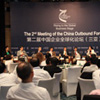
【China Daily】Travelers ’are like country’s diplomats’
Outbound tourism seen as having strong role in country’s push to go globalThe number of Chinese going overseas on holiday has grown rapidly over the past 10 years, and the outbound tourism industry can play an important role in China’s globalization, experts say.Wang Huiyao, president of the Center for China and Globalization(CCG), says China’s opening-up is part of its citizens going on overseas holidays.Last year, China’s outbound tourism industry was worth $160 billion (150 billion euros), which is higher than Chinese companies’ combined outbound investment of $140 billion."China’s globalization is people’s globalization," Wang said at a meeting of the China Outbound Forum in Sanya, Hainan province."People first travel to a country, and then want to study, work and invest there."Delegates at the forum discussed the latest trends of Chinese companies’ efforts in going global, and the challenges and potential of development."Every day about 20,000 people travel between China and the US, and about 15,000 travel between China and Europe," Wang said."One of China’s biggest soft powers could be its tourists. If they could go global and act properly overseas, and at the same time spend money, they would be good diplomats and improve China’s image."Qian Jiannong, vice-president of Fosun, the investment group, says over the past few years China’s outbound tourism has grown more than 40 percent a year, and the domestic market is growing rapidly, too. He agrees that tourists play an important role in globalization."For example, the Belt and Road Initiative is not only about building railways, highways and airlines. It is more about economic, cultural and people exchanges in various countries."Fosun says it is increasing its global investment in tourism. It bought the French resort operator Club Mediterranee, has invested in the British tour operator Thomas Cook Group, and has many travel agencies in China and India."In the rapidly growing tourism industry, I don’t think the supply of products in China can keep up with changes that are taking place in the market or make the most of the opportunities that national strategies such as the Belt and Road deliver," Qian says.The Chinese tourism industry and the products it delivers need a shake-up because they have not kept pace with demands that have changed as people’s incomes have grown, he says."Most of China’s tourism products are stuck in this phase where tourists are taken to scenic spots to take photos, but they are not given the chance to relax or do anything else. One of the most difficult things with Chinese holidays is that tourists have to line up at scenic spots, and wherever they go there is heavy traffic."But if you have the right products, ones that allow people to stay in one place for a few days, it would be much less crowded."Tourism has great potential, he says, and Fosun will continue to increase investment in products that China lacks, particularly in areas of short supply."We will do that globally, not only in one country, because tourism is global. We also hope that through Fosun’s global tourism resources investment and acquisition we can reshape the global tourism industry."Henri Giscard d’Estaing, chief executive of Club Mediterranee, says Chinese tourists’ habits are changing.They used to like visiting as many places as possible, he says, but now many are keen on taking things more slowly and lapping up local culture.China is the company’s biggest market, he says, and Chinese customers stay at the company’s resorts for an average of 3.5 days. Ten years ago they would have stayed for just a night. For the club this represents an opportunity to introduce new products for Chinese tourists.For China, the challenge is that its tourism industry lacks the experience of, for example, the industry in Europe, Giscard d’Estaing says. However, the country has many highly attractive tourist sites, and it needs the right resources and talents to run them.Zhang Lingyun, a professor at Beijing Union University, says last year Chinese tourists made 3.6 billion domestic trips, generating turnover of about 3 trillion yuan ($468 billion; 440 billion euros), and many international companies are targeting Chinese tourists."The supply of products needs to be raised. In addition, the industry needs to go global, but that does not just mean tourists going abroad. Our logistics, information and capital flow need to integrate with the international market," he says.(By Chen Yingqun)From China Daily, Nov. 27, 2015
2015年11月30日 -
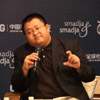
【人民网】李思彦:中国企业全球化发展需要国际化的人才教育体制
人民网11月22日电 (文小琳)三亚消息:由中国与全球化智库(CCG)主办的第二届“中国企业全球化论坛”今天继续在海南三亚举行。在“中国企业海外投资如何开始重塑全球商业版图”全体大会上劳瑞德教育集团中国区总裁李思彦提出中国企业全球化发展需要国际化的人才教育体制。 李思彦说,如何培养全球化的人才对于全球化来说是非常关键的。中国企业走出去时,如何熟悉当地的游戏规则,在当地有更好的影响,跟当地有很好的互联互接是非常重要的问题。现在中国企业走出去的时候更多是以资源合作形式走出去,也有一些是以商务的形式走出去。如果我们不能真正的扎根于当地,把中国企业办成一个全球化的企业,而只是一个中国企业在全球化运营,其实是非常困难的。一些中国企业在国际化的过程中有各种不同层次的声音和反响。有些项目最后没能实施建设,有的项目受到当地的抵制。有时是因为中国国内派出去的人才不能很好的驾驭当地的商业环境,帮助中国企业在当地建立自己的商域和体系,完善中国企业在这些国家的机制。 因此我们需要在全球化过程中引入国外人才到我们的体系里面去,但更重要的是,我们也需要有一个很好的体制去培养适合国际化的中国人才。这需要教育的国际化,真正帮助我们在新的国际形势下在人文交流层面有更好的通路。国际化的教育能够帮助人才更好的去结合当地的需求。这也是教育国际化和终生教育的连接点。 所以对于教育者来说,随着互联网的发展,我们可以提供在线教育为机制的平台,不管他们是以怎么样的国家文化为起点,我们的教育都能够满足这些学生的需要。在某一个国家、某一个文化体系、甚至需要学某一个语言的时候,能够有一个非常好的在线和线下的学习平台帮助学术更好的发展。这是未来在教育领域随着互联网经济发展能够有的最大的变化和革新。 如何把高等教育的学历学制和终生学习的体制结合起来,这是教育界在未来五到十年要思考的。随着学术的发展,在五年、十年、二十年之后,怎么样把他的教育需求和企业给他的教育需求结合起来。大学在这当中扮演更重要的地位,同时在全球有这样一个大学平台和网络帮助学生能够在不同国家、不同地区获取到这样的教育体验。这个嫁接的桥梁是非常大的一个机会,对于中国企业来说,怎么样在走出去的同时把人才体系建立好,是非常大的一个机会。文章选自人民网,2015年11月22日
2015年11月30日 -
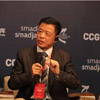
【人民网】王广发:打造适应全球化商业运作的国际人才
人民网北京11月22日电(记者覃博雅)由中国与全球化智库(CCG)主办的第二届中国企业全球化论坛今天闭幕。在全体大会上,围绕“中国企业海外投资如何开始重塑全球商业版图”话题,法政集团董事长、中国与全球化智库(CCG)咨询委员会副主席王广发表示,由于中国经济的全方位快速发展,中国企业正在经历一个“大破大立”的阶段,正朝着未来国际游戏规则积极参与者角色进发。 王广发指出,中国的国际地位和责任担当今非昔比,已经开始向全球输出维持秩序的正能量,甚至连“一带一路”沿线国家都纷纷参与到展示中国正能量的行列中来。按照惯例,游戏秩序的规则制订者发达国家不会愿意让新的游戏规则、新的游戏秩序来突破其形成的垄断,但现在有越来越多的国家积极要求中国参与规则制定。他提出这样一个问题:我们用什么样的力量去驾驭未来的国际游戏规则? 王广发认为,随着国际秩序的改变,游戏规则势必“大破大立”——破就是批判,立就是改革。他认为,要主抓教育改革,“从娃娃抓起”,以进行国际标准化的人才培养,打造将来适应全球化商业运作的国际人才。他相信,如此一来,经过二十年的筹备,中国势必将出现一批涉及国际秩序、人文、安全、经济、商务、人才、科技、研发、知识产权的杰出智库人才,实现与发达国家在学习模式上的互联互通,促进中国企业在“大破大立”之后积极成长起来。文章选自人民网,2015年11月22日
2015年11月30日 -
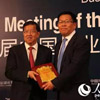
【人民网】钱建农:从全球化浪潮中寻找壮大的机会
人民网北京11月22日电(记者覃博雅)由中国与全球化智库(CCG)主办的第二届中国企业全球化论坛的“致敬之夜”环节中,复星集团的副总裁兼复星旅游及商业集团的总裁钱建农表示,企业进行海外投资,既要顺应全球化的潮流,也不能脱离中国实际国情。 代表复星集团领取“全球化杰出成就奖”的钱建农表示,复星集团早在全球化兴起初期就明确制定了相应战略——提出“中国动力嫁接全球资源”、“走到世界的最根本的出发点还是中国”等方阵,使集团的全球化策略与中国发展紧密结合在一起。他用复星集团的投资项目来解释:复星投资的许多企业虽然涉及金融、保险、旅游、消费品和房地产等多个方面,但几乎所有项目均基于中国中产阶级的成长而设定。在过去,中国依靠劳动力成本的廉价优势,出口导向型经济发展较好;如今中国的经济地位非同以往,已成为全球首屈一指的消费大国,因此,这些项目的比较优势与海外投资相结合,取得了巨大的成功。 钱建农指出,在全球化的今天,机遇也蕴藏于危机之中——2008年全球金融危机之后,中国的比较优势发生了巨大变化,海外许多产业希望能进入中国市场;而许多海外企业也处于低估值状态(适宜购并或投资合作——本网注),对中国企业而言,是非常好的“走出去”时机。他指出,复兴当年就是抓住了这个时机,做了一些成功的收购,下一步的方向是提升整合海外投资的能力。文章选自人民网,2015年11月22日
2015年11月30日 -
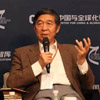
【人民网】吴建民:中国企业“走出去”需要克服狭隘思维
人民网北京11月20日电(记者覃博雅) 三亚消息:由中国与全球化智库(CCG)主办的第二届“中国企业全球化论坛”今天在海南三亚开幕。原中国驻法大使、国家创新与发展战略研究会常务副会长吴建民表示,中国企业已经逐渐认识到“走出去”是应有之路,但仍面临许多意识上的不足。 吴建民表示,中国企业正处于“走出去”的大潮前夜——除了大企业之外,更多的中小企业也在逐步成为“走出去”的主力军。但他强调,“走出去”需要面临几个问题: 首先,需要更新知识,了解当地的“办事之道”。多数国内做得很成功的企业往往是遵循了中国的办事之道,而这些企业如果在国外碰得“头破血流”乃至失败,归根结底还是以为国内这套方法在国外还“行得通”。 其次,要更新观念,活用中介机构。吴建民指出,包括国际咨询机构和律师事务所在内的各色中介机构,在跨国贸易中是十分重要乃至必须的存在,“不是找一找当地的翻译就可以的”。 再次,中国企业“走出去”的标杆是由跨国公司逐渐演变为全球公司。凡是在国外失败的企业,往往没有与合作方做到“共赢”,或是没有在追求股东利益最大化的同时考虑对当地的环境和社会责任,从而留不住高管和各种人才,得不到当地的认可,从而失败。他借用一位专家的观点指出,真正的全球性质公司,在销售、雇员和资产的比例上,往往是海外部分超过国内。 吴建民总结道,中国企业“走出去”伊始,失败不可避免,关键仍是从失败中吸取教训,才有可能获得成功。文章选自人民网,2015年11月20日
2015年11月30日